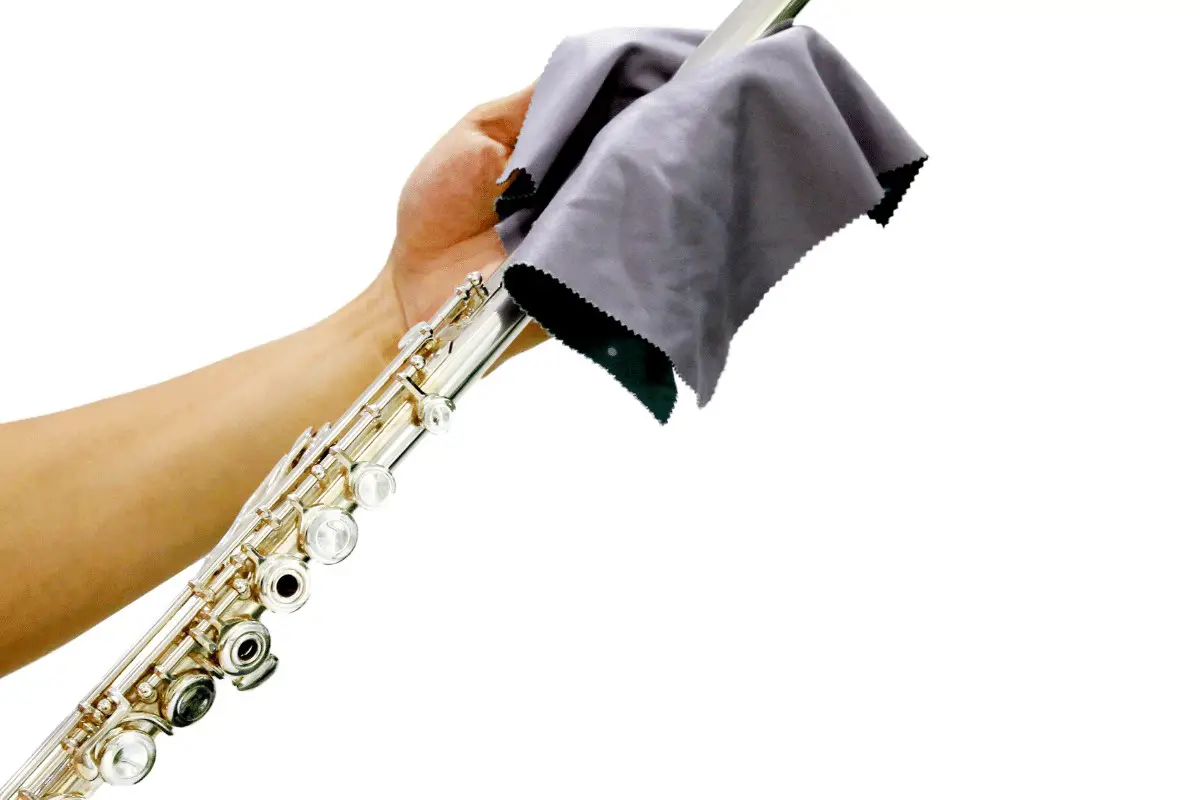I cringe when I look at some of my students’ wind instruments, especially the flutes.
For such an easy-to-clean-instrument, I see too many spots and discolorations as well as buildup and potential bacteria.
I wanted to clear the air once and for all around this topic and tell you how to clean your flute with rubbing alcohol in minutes.
To clean a flute with rubbing alcohol, take a cotton swab with rubbing alcohol soaked into it and rub around the mouthpiece and lip plate. This will kill any bacteria on and around this spot without the need for bleach. Don’t use rubbing alcohol inside the body of the flute or around the keys.
Instrument hygiene is serious, folks. It’s possible to get infections from instruments if you aren’t careful.
Let’s dig into the details and other related questions and helpful info on this topic.
Table of Contents
Step By Step: How To Clean A Flute With Rubbing Alcohol
Here are 4 quick and easy steps for cleaning your flute with rubbing alcohol.
I won’t even bother linking to one because you probably have some in your cupboard or can pick one up from your next shopping trip.
No need to get anything fancy here.
#1 Wipe The Flute Free Of Debris
Use a first microfiber cloth or another soft cloth to wipe down the exterior of the flute.
Pay attention to any visible signs of debris or smudges from sweaty hands.
Never play the flute while chewing gum, eating, or drinking anything other than water.
The bits of food and sugar will collect inside and around the keys causing major problems with the function of your instrument.
#2 Soak Your Cotton Swab Or Cotton Ball With The Alcohol
Now, soak your cotton swab or ball or cloth with alcohol. You want to reach the point where it’s not dripping with the liquid, but it almost is dripping.
Alcohol wipes remove this step altogether.
If you’re using swabs (commonly known as Q-tips), dip the swab into the liquid itself and tap until it doesn’t drip anymore.
If you’re using balls, cover the end of the container with the cotton ball and tilt the container until the liquid soaks into the ball.
#3 Wipe Down The Lip Plate And Body While Avoiding Keys And Cork
Use your swab to wipe down the exterior of the flute from the head to the middle and foot joint too.
Take care to avoid getting any liquid inside the mouthpiece itself. The headjoint cork inside the top of the flute headjoint is critical for good sound and tuning.
If you get it wet, it’s a pain to fix.
Also, take care around the keys. The key pads use cork and other pads which don’t handle being wet well.
Stick the exterior metal of the instrument, especially around the embouchure hole and lip plate.
This is where you place your lips to play, and it collects a lot of the germs.
#4 Let Air Dry And Then Wipe Down With A Microfiber Cloth
Let the alcohol sit with exposure to air for about five minutes, and then come back with a microfiber cloth to dry, remove any excess, and finish wiping off the grime.
Rubbing alcohol works great for sanitizing and cleaning a flute because it isn’t hard on the finish and silver metal while still killing a lot of germs.
Finish cleaning out your flute by using your swab that came with the instrument on the inside to soak up any collected moisture.
It’s that easy! Seriously, it takes but a few minutes from start to finish!
For visual learners, check out this video.
Note: I don’t recommend cleaning the keys much unless you’re really careful to have little to no moisture there.
Other Kinds Of Cleaners For Flute Cleaning
For the most part, cleaning your flute is simple. There’s not much else to do other than wipe off the mouthpiece, specifically the lip plate, and swab out the inside to remove moisture.
Still, I’ve seen a lot of students use different chemicals and other things to wipe their flutes down.
Are they all good and fine for the woodwind instrument? Definitely not.
I tracked down some of my musical instrument repair friends and asked them what they thought was the best.
For the most part, they all agreed rubbing alcohol or an alcohol wipe is the best option.
Here’s the gist of what they said about the other types of cleaner:
Bleach As A Flute Cleaner
Bleach is a powerful oxidizing agent and will damage the protective layer on the silver.
The damage to silver should be on the surface only. Remove and restore with commercial silver polish.
Still, it’s not worth the risk and work. If you use it on a gold flute, bleach will quickly destroy the finish and possibly irreparably harm the metal.
Soap And Water
I don’t like this option either.
Yes, soap and water will kill germs, but it’s risky. If you get the cork inside the head joint or the key pads wet, you’ll probably then need to replace them, which is a pain and costs a decent amount.
Soap may also end up taking off some of the finish, and then the water may oxidize or rust your flute body.
Spray Cleaner
Sure, it’ll work OK, but you can’t always control where the spray goes. If you use a cleaner (such as window cleaner), make sure you spray onto a paper towel or cloth and then wipe.
Then, you also must make sure you wipe it off in a couple of minutes with a damp cloth.
Vinegar
Vinegar is a good cleaning option for most instances. We use it all the time at my house as a natural cleaner for many items.
Unfortunately, just like bleach, vinegar does break down the finish on your flute with its corrosive quality.
Yes, to a much lesser degree, but it’s still not good.
This will not only dull the look of the flute but also potentially damage the exterior of the instrument forever.
Hydrogen Peroxide
This works just fine, but you need to make sure you wipe it off and remove the chemical with a damp cloth afterward. Nothing is too harmful with this, but it’s not something people have as available or are as comfortable with using.
Again, just make sure to not use the hydrogen peroxide on the inside of the mouthpiece, pads, or corks as they can be damaged.
Apply a couple of drops to the first microfiber cloth and then rub in a circular motion on the flute, avoiding the pads and cork.
FAQ
What is denatured alcohol?
Ethanol that has methanol added so it can not be drunk.
Is denatured alcohol safer than rubbing alcohol?
It’s not that it’s safer, but it won’t leave water spots when it evaporates.
What do you use to clean your flutes?
I recommend 99% isopropyl alcohol (any one from the grocery store is perfect) to clean flutes.
How do I dry my flute?
A good microfiber cloth is perfect for picking up every last bit of moisture and removing those last bits of fingerprints and smudges.

